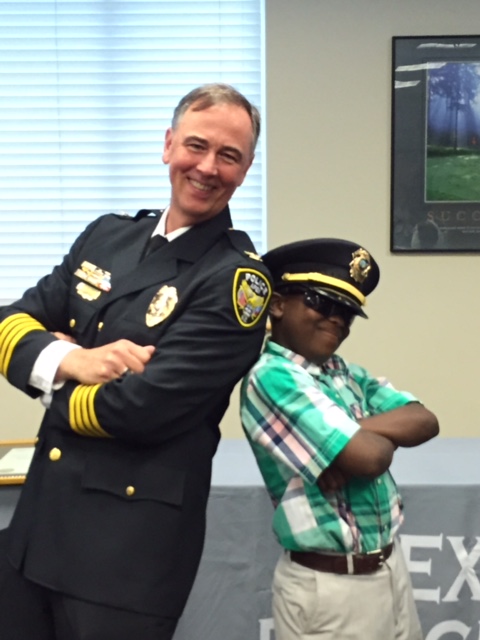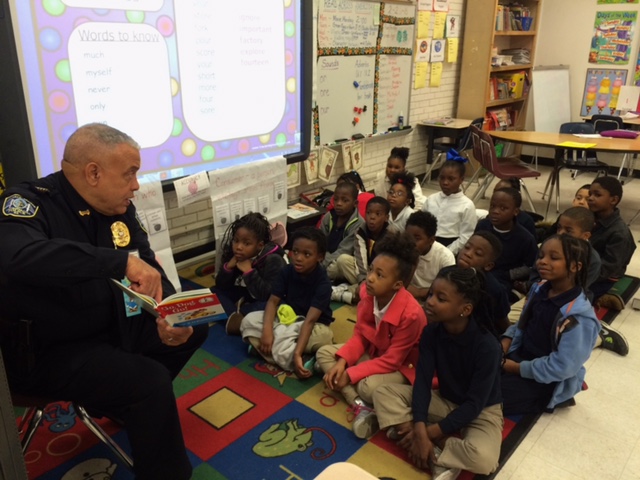Meet the Leadership Blog Series: Beginning their Law Enforcement Careers at a Young Age
Name: John Letteney
Title: Chief of Police
Agency: Apex, North Carolina, Police Department
Year Joined the IACP: 2005
Reason for Going into Law Enforcement: I was drawn to the profession through my experience as a Law Enforcement Explorer and learned at a young age what “community policing” was, long before the term was embraced by police and community. The dedication of the officers I volunteered with challenged me, taught me, and inspired me. Some of those lessons I learned almost forty years ago, formed the foundation of what I know to be “good police work” and that I still teach today. The overarching perspective was to be a guardian while serving the community and protecting life and property.
First Heard about IACP: As I was advancing through the ranks, I began to take notice how my supervisors and commanders were learning to be effective. I saw that executive command level leaders were associate members of IACP and attended the conferences. I made a point of asking them about the training and other conference activities and got the impression that IACP was a professional association that offered great training, networking, and the opportunity to enhance leadership skills. IACP was (and is) the leader on developing best practices in law enforcement.
Becoming More Involved in IACP: When I became a chief of police, I knew I would need the kind of training that IACP offered. I was a bit anxious about the responsibilities and knew I would need a network of professionals I could call upon when I had a question or needed advice. I joined both my state association as well as IACP, and the balance was exactly what I needed. Through my state association, I was able to connect with local, regional, and state-wide law enforcement professionals who could help with state regulations. IACP offered a much wider opportunity to learn about best practices around the globe and obtain top-level training from legends in the profession.
Favorite Part About Being in Law Enforcement: The opportunity to help others; to make a difference and make our communities a better place. I often see the idealism of an officer who just graduated from the academy and that he/she wants to change the world. While that is a laudable goal, it is not a realistic one. What is realistic though, and what we can do every day, is change someone’s world.
The Most Challenging Part of Law Enforcement: One of the most significant current challenges is the disrespect our profession can face and the resultant officer safety issues. We need to be ever vigilant to keep our officers safe as we build relationships with our communities. A community that respects its police, even when they may not agree with a particular issue, is more likely to engage in positive dialogue than resort to violence.
One Piece of Advice for the Leaders of Tomorrow: Never stop learning. Be open minded to see other perspectives and identify ways to be a more efficient and effective leader. See your role as a responsibility, not as one of authority.
Name: Joseph Lumpkin
Title: Chief of Police
Agency: Savannah-Chatham, Georgia, Metropolitan Police Department
Year Joined the IACP: Sometime in the early 1990s
Reason for Going into Law Enforcement: As a child I would always play the role of Elliot Ness from the Untouchables TV series. I wanted to purge the world of gangsters and criminals. During my early adolescence and the brutality observed during the civil rights movement in the early 1960s, I moved away from viewing most southern police officers as trusted community helpers. In the summer of 1964 as Lt. Col. Lemuel Penn travelled from Ft. Benning back to Washington, D.C., he was shot and killed by “night riding” Klansman.
Although the FBI did not get a conviction in Georgia, they did convict the Klansman in Federal Court and I knew change was possible after those arrests. In 1970, a protest march by black high school students over the potential loss of their school’s name during integration, resulted in “riots” by the students. As a University of Georgia student, I thought the police escalated the engagement to a riot. When I spoke with the Mayor regarding my perception, he asked that I and others join the police department to help create the change we thought was possible. I joined the Athens Police Department to spend a few years creating desired change and have spent the last 46 years plus practicing Peelian Policing.
First Heard about IACP: I have known of IACP for decades and probably learned of IACP mostly from Chief Everett E. Price, who was my police chief from 1975-1988.
Becoming More Involved in IACP: I believe as a member of IACP leadership, as a representative body in a diverse and culturally changing world, we must receive broad input. To properly assist and council in broad national and international policy development, IACP must have the views, opinions, suggestions and thoughts from wide-ranging segments of democratic societies. I am of the opinion my life experiences have provided me a basis to recognize some areas of interests that others may not recognize.
Favorite Part About Being in Law Enforcement: Growing and developing our department’s personnel to the degree they want to engage individuals of varied cultures and backgrounds and help them solve their problems.
The Most Challenging Part of Law Enforcement: Watching the division that has developed and is growing between elements and components of our society. As a child that grew up in a legally based segregated state, I am concerned with the economic segregation as well as the accompanying housing and educational segregation that America is experiencing. As a police officer during the 1970s, I directly experienced the violence directed toward police officers.
As a police chief, my first responsibility is to keep my officers and police civilians safe. If the police officers are not safe, we cannot maintain safety of our citizenry and visitors. Ultimately, reducing the dangers to our officers requires we sustain fruitful relationships with greater percentages of our citizenry as we serve and protect them as well as assist them in solving their problems.
One Piece of Advice for the Leaders of Tomorrow: I would refer them to one of my mentors, Dr. J. W. Fanning, and his Pillars of Leadership. Foresightedness is one of those pillars – “The past has its lessons to teach, and must be respected. The future has rewards to share, and must be embraced…” He also would often say – “never stop learning” and “may you stay alive as long as you live.”
Name: Vernon M. Keenan
Title: Director
Agency: Georgia Bureau of Investigation
Year Joined the IACP: Around 2000
Reason for Going into Law Enforcement: I’ve always been interested in police work and I had an opportunity as a student at Valdosta State College (now University) to enroll in a criminal justice class. The criminal justice students qualified for the Law Enforcement Assistance Administration (LEAA) tuition grant. This grant allowed me to focus completely on my studies.
First Heard about IACP: I have known of the IACP throughout my law enforcement career and I joined when I became a member of the command staff of the Georgia Bureau of Investigation.
Becoming More Involved in IACP: I made several presentations at the IACP Annual Conference and Exposition and these presentations gave me exposure to the scope of IACP activities. I was first appointed to the Investigative Operations Committee, which led to an appointment on the Narcotics and Dangerous Drugs Committee (NDDC). The NDDC led to an appointment on the Board of Directors.
As I have worked on various committees and participated on the Board of Directors, I fully understand the importance of the IACP to the law enforcement profession and I want to contribute to the IACP‘s work.
Favorite Part About Being in Law Enforcement: I enjoy the challenges that are inherent with law enforcement work. I have a passion for the rule of law and I want to always seek truth and justice.
The Most Challenging Part of Law Enforcement: Navigating the political environment which leadership encounters.
One Piece of Advice for the Leaders of Tomorrow: My favorite quote is by Friedrich Nietzsche, “He who fights with monsters might take care lest he thereby become a monster.” Never believe that the end justifies the means.

Title: Chief of Police
Agency: Apex, North Carolina, Police Department
Year Joined the IACP: 2005
Reason for Going into Law Enforcement: I was drawn to the profession through my experience as a Law Enforcement Explorer and learned at a young age what “community policing” was, long before the term was embraced by police and community. The dedication of the officers I volunteered with challenged me, taught me, and inspired me. Some of those lessons I learned almost forty years ago, formed the foundation of what I know to be “good police work” and that I still teach today. The overarching perspective was to be a guardian while serving the community and protecting life and property.
First Heard about IACP: As I was advancing through the ranks, I began to take notice how my supervisors and commanders were learning to be effective. I saw that executive command level leaders were associate members of IACP and attended the conferences. I made a point of asking them about the training and other conference activities and got the impression that IACP was a professional association that offered great training, networking, and the opportunity to enhance leadership skills. IACP was (and is) the leader on developing best practices in law enforcement.
Becoming More Involved in IACP: When I became a chief of police, I knew I would need the kind of training that IACP offered. I was a bit anxious about the responsibilities and knew I would need a network of professionals I could call upon when I had a question or needed advice. I joined both my state association as well as IACP, and the balance was exactly what I needed. Through my state association, I was able to connect with local, regional, and state-wide law enforcement professionals who could help with state regulations. IACP offered a much wider opportunity to learn about best practices around the globe and obtain top-level training from legends in the profession.
Favorite Part About Being in Law Enforcement: The opportunity to help others; to make a difference and make our communities a better place. I often see the idealism of an officer who just graduated from the academy and that he/she wants to change the world. While that is a laudable goal, it is not a realistic one. What is realistic though, and what we can do every day, is change someone’s world.
The Most Challenging Part of Law Enforcement: One of the most significant current challenges is the disrespect our profession can face and the resultant officer safety issues. We need to be ever vigilant to keep our officers safe as we build relationships with our communities. A community that respects its police, even when they may not agree with a particular issue, is more likely to engage in positive dialogue than resort to violence.
One Piece of Advice for the Leaders of Tomorrow: Never stop learning. Be open minded to see other perspectives and identify ways to be a more efficient and effective leader. See your role as a responsibility, not as one of authority.
Name: Joseph Lumpkin

Title: Chief of Police
Agency: Savannah-Chatham, Georgia, Metropolitan Police Department
Year Joined the IACP: Sometime in the early 1990s
Reason for Going into Law Enforcement: As a child I would always play the role of Elliot Ness from the Untouchables TV series. I wanted to purge the world of gangsters and criminals. During my early adolescence and the brutality observed during the civil rights movement in the early 1960s, I moved away from viewing most southern police officers as trusted community helpers. In the summer of 1964 as Lt. Col. Lemuel Penn travelled from Ft. Benning back to Washington, D.C., he was shot and killed by “night riding” Klansman.
Although the FBI did not get a conviction in Georgia, they did convict the Klansman in Federal Court and I knew change was possible after those arrests. In 1970, a protest march by black high school students over the potential loss of their school’s name during integration, resulted in “riots” by the students. As a University of Georgia student, I thought the police escalated the engagement to a riot. When I spoke with the Mayor regarding my perception, he asked that I and others join the police department to help create the change we thought was possible. I joined the Athens Police Department to spend a few years creating desired change and have spent the last 46 years plus practicing Peelian Policing.
First Heard about IACP: I have known of IACP for decades and probably learned of IACP mostly from Chief Everett E. Price, who was my police chief from 1975-1988.
Becoming More Involved in IACP: I believe as a member of IACP leadership, as a representative body in a diverse and culturally changing world, we must receive broad input. To properly assist and council in broad national and international policy development, IACP must have the views, opinions, suggestions and thoughts from wide-ranging segments of democratic societies. I am of the opinion my life experiences have provided me a basis to recognize some areas of interests that others may not recognize.
Favorite Part About Being in Law Enforcement: Growing and developing our department’s personnel to the degree they want to engage individuals of varied cultures and backgrounds and help them solve their problems.
The Most Challenging Part of Law Enforcement: Watching the division that has developed and is growing between elements and components of our society. As a child that grew up in a legally based segregated state, I am concerned with the economic segregation as well as the accompanying housing and educational segregation that America is experiencing. As a police officer during the 1970s, I directly experienced the violence directed toward police officers.
As a police chief, my first responsibility is to keep my officers and police civilians safe. If the police officers are not safe, we cannot maintain safety of our citizenry and visitors. Ultimately, reducing the dangers to our officers requires we sustain fruitful relationships with greater percentages of our citizenry as we serve and protect them as well as assist them in solving their problems.
One Piece of Advice for the Leaders of Tomorrow: I would refer them to one of my mentors, Dr. J. W. Fanning, and his Pillars of Leadership. Foresightedness is one of those pillars – “The past has its lessons to teach, and must be respected. The future has rewards to share, and must be embraced…” He also would often say – “never stop learning” and “may you stay alive as long as you live.”
Name: Vernon M. Keenan

Title: Director
Agency: Georgia Bureau of Investigation
Year Joined the IACP: Around 2000
Reason for Going into Law Enforcement: I’ve always been interested in police work and I had an opportunity as a student at Valdosta State College (now University) to enroll in a criminal justice class. The criminal justice students qualified for the Law Enforcement Assistance Administration (LEAA) tuition grant. This grant allowed me to focus completely on my studies.
First Heard about IACP: I have known of the IACP throughout my law enforcement career and I joined when I became a member of the command staff of the Georgia Bureau of Investigation.
Becoming More Involved in IACP: I made several presentations at the IACP Annual Conference and Exposition and these presentations gave me exposure to the scope of IACP activities. I was first appointed to the Investigative Operations Committee, which led to an appointment on the Narcotics and Dangerous Drugs Committee (NDDC). The NDDC led to an appointment on the Board of Directors.
As I have worked on various committees and participated on the Board of Directors, I fully understand the importance of the IACP to the law enforcement profession and I want to contribute to the IACP‘s work.
Favorite Part About Being in Law Enforcement: I enjoy the challenges that are inherent with law enforcement work. I have a passion for the rule of law and I want to always seek truth and justice.
The Most Challenging Part of Law Enforcement: Navigating the political environment which leadership encounters.
One Piece of Advice for the Leaders of Tomorrow: My favorite quote is by Friedrich Nietzsche, “He who fights with monsters might take care lest he thereby become a monster.” Never believe that the end justifies the means.
